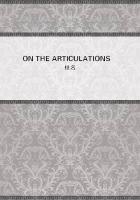'God forbid! I will never see anything of Gatherum again.What annoys me most is, and always was, that he wouldn't understand what I felt about it;--how proud I was that he should be Prime Minister, how anxious that he should be great and noble in his office;--how I worked for him, and not at all for any pleasure of my own.'
'I think he did feel it.'
'No;--not as I did.At last he liked the power,--or rather feared the disgrace of losing it.But he had no idea of the personal grandeur of the place.He never understood that to be Prime Minister in England is as much as to be an Emperor in France, and much more than being President of America.Oh, how Idid labour for him,--and how did he scold me for it in those quiet little stinging words of his! I was vulgar!'
'Is that a quiet word?'
'Yes;--as he used it;--and indiscreet, and ignorant, and stupid.I bore it all, though sometimes I was dying with vexation.Now it's all over, and here we are as humdrum as anyone else.And the Beeswaxes, and the Robys, and the Droughts, and the Pountneys, and the Lopezes, have all passed over the scene.Do you remember that Pountney affair, and how he turned the poor man out of the house?'
'It served him right.'
'It would have served them all right to be turned out;--only they were there for a purpose.I did like it in a way, and it makes me sad to think that the feeling can never come back again.
Even if they should have him back again, it would be a very lame affair to me then.I can never again rouse myself to the effort of preparing food and lodging for half the Parliament and their wives.I shall never again think that I can help to rule England by coaxing unpleasant men.It is done and gone, and can never come back again.'
Not long after this the Duke took Mr Monk, who had come down to Matching for a few days, out to the very spot on which he had sat when he indulged himself in lecturing Phineas Finn on Conservatism and Liberalism generally, and then asked the Chancellor of the Exchequer what he thought of the present state of public affairs.He himself had supported Mr Gresham's government, and did not belong to it because he could not at present reconcile himself to filling any office.Mr Monk did not scruple to say that in his opinion the present legitimate division of parties was preferable to the Coalition which had existed for three years.'In such an arrangement,' said Mr Monk, 'there must always be a certain amount of distrust, and such a feeling is fatal to any great work.'
'I think I distrusted no one till separation came,--and when it did come it was not caused by me.'
'I am not blaming anyone now,' said the other; 'but men who have been brought up with opinions altogether different, even with different instincts as to politics, who from their mother's milk have been nourished on codes of thought altogether opposed to each other, cannot work together with confidence even though they may desire the same thing.The very ideas which are sweet as honey to the one are bitter as gall to the other.'
'You think, then, that we made a great mistake?'
'I will not say that,' said Mr Monk.'There was a difficulty at the time, and that difficulty was overcome.The Government was carried on, and was on the whole respected.History will give you credit for patriotism, patience, and courage.No man could have done it better than you did;--probably no other man of the day so well.'
'But it was not a great part to play?' The Duke in his nervousness, as he said this, could not avoid the use of that questioning tone which requires an answer.
'Great enough to satisfy the heart of a man who has fortified himself against the evil of ambition.After all, what is it that the Prime Minister of such a country as this should chiefly regard? Is it not the prosperity of the country? Is it not often that we want great measures, or new arrangements that shall be vital to the country.Politicians now look for grievances, not because grievances are heavy, but trusting that the honour of abolishing them may be great.It is the old story of the needy knife-grinder who, if left to himself, would have no grievance of which to complain.'
'But there are grievances,' said the Duke.'Look at monetary denominations.Look at our weights and measures.'
'Well; yes.I will not say that everything has as yet been reduced to divine order.But when we took office three years ago we certainly did not intend to settle those difficulties.'
'No, indeed,' said the Duke, sadly.
'But we did do all that we were meant to do.For my own part, there is only one thing that I regret, and one only which you should regret also till you have resolved to remedy it.'
'What thing is that?'
'Your retirement from official life.If the country is to lose your services for the long course of years during which you will probably sit in Parliament, then I shall think that the country has lost more than it gained by the Coalition.'
The Duke sat for a while silent, looking at the view, and, before answering Mr Monk,--while arranging his answer,--once or twice in a half-absent way, called his companion's attention to the scene before him.But during this time he was going through an act of painful repentance.He was condemning himself for a word or two that had been ill-spoken by himself, and which, since the moment of its utterance, he had never ceased to remember with shame.
He told himself now, after his own secret fashion, that he must do penance for these words by the humiliation of a direct contradiction of them.He must declare that Caesar would at some future time be prepared to serve under Pompey.Then he made his answer.'Mr Monk,' he said, 'I should be false if I were to deny that it pleases me to hear you say so.I have thought much of all that for the last two or three months.You may probably have seen that I am not a man endowed with that fortitude which enables many to bear vexations with an easy spirit.I am given to fretting, and I am inclined to think that a popular minister in a free country should be so constituted as to be free from that infirmity.I shall certainly never desire to be at the head of Government again.For a few years I would prefer to remain out of office.But I will endeavour to look forward to a time when I may again perhaps be of some humble use.'
End















